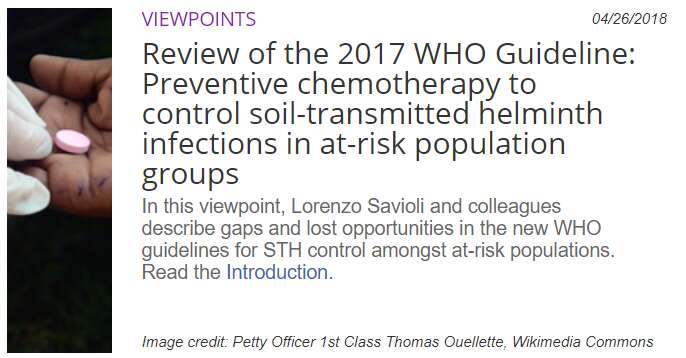
By Professor Russell Stothard
The week before last the Strategic and Technical Advisory Group (STAG) at WHO-Geneva convened to discuss the performance of Neglected Tropical Diseases (NTDs) control programmes and plan for WHO 2020 and SDG 2030 targets. Within the NTDs, important helminth diseases include the soil-transmitted helminthiases (STHs), a diverse group of species of gastrointestinal nematodes. Many of these worms are found across the world, and sometimes transmission cycles can be zoonotic. For example, the giant roundworm Ascaris is ubiquitous across the world, especially where WASH (water, sanitation & hygiene) is inadequate and food safety poor. Lesser known perhaps is that worms are still endemic in the UK and historically infected our 15th Century King, Richard II. Adult Ascaris worms again recently captured international media attention being found within the North Korean soldier and defector. This indicated his inadequate access to deworming medications which in other parts of the world is more equitable and can be received through primary health services and/or preventive chemotherapy (PC) campaigns. The origins of PC can be traced back over 100 years, beginning in the USA with actions on hookworms, while today supporting the scale-up of PC for STH with appropriate integration of broader actions on NTDs is an imperative of COUNTDOWN.
On the 29th September 2017, the WHO published a new guideline on the implementation of PC programmes for STH seeking to update those guidelines gone before. While this new guideline has much merit, it inadvertently recreates disease-specific silos and overlooked the need for integration of STH within NTD control in general. This spurred me to write a commentary with colleagues that was published in April’s PLoS NTDs in an attempt to open a broader debate on needs for integration. The guideline’s infirm stance on health equity does little to provide programmatic guidance on practical issues for those implementing control. For example, what is the best method to reach those most vulnerable to STH with which drug delivery system – how much are we prepared to cost? We were happy that our article generated a response pointing towards the valuable role the research community has to offer and raised our awareness of two new forthcoming treatises on the impact of deworming by Serene Joseph et al. in press within PLoS NTDs.
To regress poverty and impoverishment, there is no single ingredient (e.g. guideline) or recipe (e.g. recommendations) but rather a careful consideration on how the future world might judge us if our actions on worm control were curtailed or even stalled. We advise that STH control programme managers should value all evidence and balance this with their own experiences on-the-ground to better guide them.
